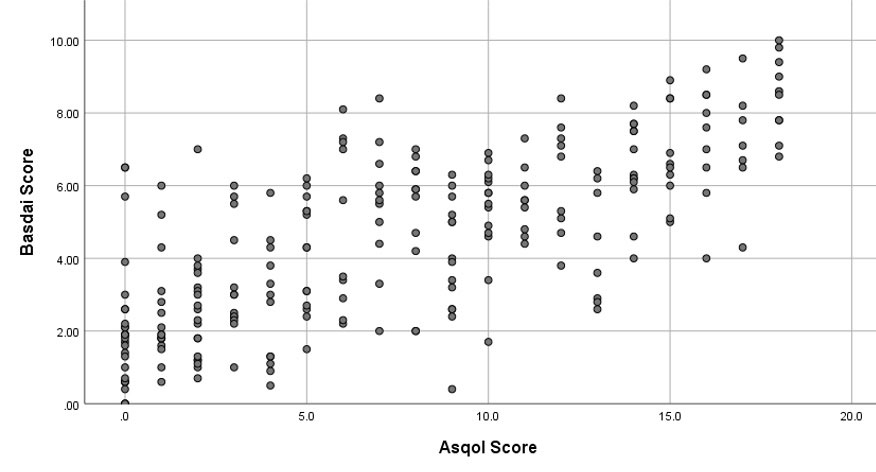Session Information
Date: Saturday, November 12, 2022
Title: Spondyloarthritis Including PsA – Treatment Poster I: AxSpA
Session Type: Poster Session A
Session Time: 1:00PM-3:00PM
Background/Purpose: The tools to assess disease activity and quality of life in axial spondyloarthritis (axSpA) were developed in ankylosing spondylitis cohorts biased towards inclusion of males. At present, it remains unclear how these tools capture disease experience in females. The Ankylosing Spondylitis Registry of Ireland (ASRI) is an epidemiological data source on patients with axSpA in Ireland. The aim was to examine and compare sex specific relationships between disease activity (as assessed by BASDAI) and quality of life (as assessed by ASQoL) in patients with axSpA.>
Methods: IBM SPSS version 26 was used to run the analysis of the patient population registered in the ASRI to date. Patients with both BASDAI and ASQoL scores were included. Variables were assessed with a Shapiro-Wilk’s test for normal distribution. Variables were also assessed for presence of a monotonic relationship by visual inspection of a scatterplot of the two variables. Once a monotonic relationship was established, records were split by sex and a Spearman’s rank-order correlation was undertaken to assess strength of correlation of scores within each sex.
Results: Overall, 888 patients were assessed for inclusion. Data on both BASDAI and ASQoL scores were available for analysis on 879 patients. For both outcomes means were significantly higher in females compared to males (BASDAI 4.57 vs 3.83, p< 0.01; ASQoL 7.51 vs 6.12, p< 0.01). There was a statistically significant, strong positive correlation between BASDAI and ASQoL scores in the axSpA patients, rs =0.765, p< 0.01, translating clinically to higher BASDAI scores being associated with worse ASQoL scores. Analysis by sex showed the positive correlation becomes stronger if assessed within each sex for men (figure 1) but weaker for women (Males rs(644) =0.774, p< 0.01 vs Females rs(238)= 0.728, p< 0.01) (figure 2).
Conclusion: This analysis demonstrates that there is a stronger relationship between disease activity and quality of life in men with axSpA than women. This raises the question, are lower levels of increased disease activity resulting greater negative impact on quality of life in women compared to axSpA men? Striving to answer this is critical to improving interpretation of patient outcomes between sexes in axSpA. Furthermore, this highlights the need for development and validation of tools to capture disease activity and patient experience of women with axSpA.
To cite this abstract in AMA style:
Maguire S, Wilson F, Gallagher P, O'Shea F. Are the BASDAI & BASFI Capturing the Full Impact of Disease Activity on Quality of Life in Women with Axial Spondyloarthritis? [abstract]. Arthritis Rheumatol. 2022; 74 (suppl 9). https://acrabstracts.org/abstract/are-the-basdai-basfi-capturing-the-full-impact-of-disease-activity-on-quality-of-life-in-women-with-axial-spondyloarthritis/. Accessed .« Back to ACR Convergence 2022
ACR Meeting Abstracts - https://acrabstracts.org/abstract/are-the-basdai-basfi-capturing-the-full-impact-of-disease-activity-on-quality-of-life-in-women-with-axial-spondyloarthritis/


